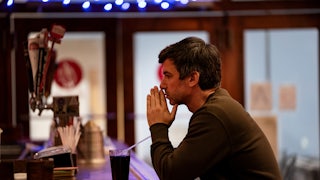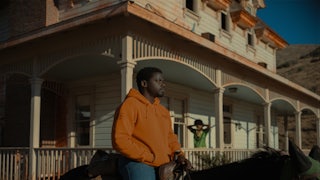A MILF, an influencer, and a doll-faced, baby-talking 26-year-old are lolling around together, long hair and limbs strewn across pillowed surfaces, for their version of story time. The mother, Marilyn (Jennifer Jason Leigh), is recounting for her two daughters, each in turn, their origin stories: the pregnant model she picked up at a furrier’s on Wiltshire and took in as her comrade, who gave birth to Treina (Taylour Paige) before moving on with a guy she met at a Scientology meeting; the personal trainer from Florida (one in a long line of interchangeable men) she’d barely remember if he hadn’t knocked her up and bestowed on her the still inexplicably childlike Sarah Jo (Kristine Froseth).
Rather than the TriBeCa setting of Tiny Furniture or the Greenpoint of Girls, Sharp Stick takes place on the West Coast, somewhere on the low-rent outskirts of Hollywood, yet we can instantly recognize the ingredients of family life as conjured by writer-director Lena Dunham: a motley assortment of femmes, grooming one another in every sense; a blend of sexual frankness, perversity, and faux-cynicism with blithe, insistent naïveté; a tiny hothouse cocoon, self-created and self-referential, that bleeds into the world outside, rendering it a more or less harmless and comical adventure playground.
Most familiar of all from the Dunham oeuvre is the sense that even within this claustrophobically intimate group, each individual inhabits her own protective narcissistic bubble. Marilyn does invest in Treina’s outfits and dole out unpromising dating advice (“men love a problem, interesting men, you know, complicated men, they love a backstory”). Sarah Jo, who works part-time as a babysitter for kids with special needs, photographs semi-clad Treina at otherwise hard-to-reach angles for her followers. She helps her mother, a property manager, by collecting rent and serving handwritten eviction notices on the inhabitants of nearby housing units. Yet through it all, they seem to notice very little about one another. Sarah Jo, an Alice band–wearing virgin who bears scars from an emergency hysterectomy in her teens, displays an extreme sexual ignorance, impervious to the cheerful smut coming from the other women in her household: She’s never seen porn, let alone a real-life penis, and believes oral sex is performed by literally blowing air. Treina greets her sister’s alienness with unsurprised acceptance—that’s just how Sarah Jo is.
She is, in fact, a lot like the slightly lost and unfiltered characters Lena Dunham became famous for playing herself. When Girls first appeared on HBO a decade ago, it marked a departure from the polished half-hour sitcoms that had dominated the ’90s and ’00s, with its unpredictable tone and messy, unresolved storylines; its candid portrayal of young women’s sexual and emotional lives from their own perspectives; and its striking willingness to address the meta question—which had hovered absurdly over the likes of Friends and Sex and the City—of how these New York–based characters had seemingly endless leisure time to hang out together.
Even at the time, Girls was asked to bear far too much representative weight—and Dunham’s willingness to play on her media status as “a voice of a generation” meant her public gaffes drew as much attention as her creative work. Her first feature since Tiny Furniture in 2010 would seem an ideal opportunity to shed that ludicrously ill-fitting mantle, breaking away from the preoccupations of her twenties. And yet Sharp Stick’s greatest weakness might be how hard it leans on that old Lena Dunham type, with Froseth playing a kind of Dunham substitute (not unlike Owen Wilson standing in for Woody Allen). Aptly enough for a coming-of-age movie, it attests to the difficulty of escaping an earlier version of oneself.
More uneven than Tiny Furniture, the new film feels marked by Dunham’s intervening years of television work, stringing together a few episodic strands that could each have served as its own admittedly well-worn storyline. The two of these involving Sarah Jo’s self-discovery get the most time and attention: Using a fail-safe line cribbed from Marilyn (“Do you find me beautiful?”), she seduces Josh (Jon Bernthal), the gentle, insecure father of one of her babysitting charges and househusband of a heavily pregnant, high-powered real estate professional played with pleasing acidity by Dunham herself; then, when Josh inevitably disappoints Sarah Jo, leaving her concerned that she may be “bad at sex,” she embarks on a quest to research every depraved act she can find in online porn and check it off her IRL list one internet-sourced stranger at a time.
Froseth throws herself into the role with such impeccable intensity and commitment that, for whole stretches, you can almost ignore the nagging falseness of the enterprise—there are moments in the scenes of sexual exploration between her and Josh, in particular, that feel unnervingly true. But it should be no insult to the sheer inventiveness and technical precision that went into Dunham’s on-screen persona to say that it’s nontransferable, that it relied on her individual qualities and played off a very specific set of social expectations.
Dunham has always been a master of dialogue and, sometimes despite herself, a sharp observer of interpersonal dynamics, who can find real surprises within old tropes, and draw reserves of feeling from people or situations that might at first seem alienating or grotesque. But what truly set her apart was her ability to fuse her skills as a writer and director with those of a performance artist—more specifically, a brilliant physical comedian.
At its best, Dunham’s clowning could evoke the likes of Buster Keaton: No one who saw Tiny Furniture will forget the moment when her character, Aura, atop a deflating blowup mattress, looks wearily into the camera as she descends, slow and smooth and steady, all the way out of shot. And Girls was full of such visual jokes, which often employed an insistently childish sexual provocateurism: “If it’s making you uncomfortable, I can cover my bush,” Hannah Horvath tells her boyfriend’s aghast roommate, yanking her nightshirt down over her crotch so hard that her bare breasts pop out of the neck hole; reprimanded for inappropriate behavior by her boss at a teaching job, she responds, “Can you think of a solution?” while campily uncrossing her legs (short skirt, no underwear) à la Sharon Stone in Basic Instinct.
There was more to the Dunham persona than this sexual jester act, but it serves as a microcosm for the whole: The sex stuff was just one expression of the self-parody she’d perfected, even before Tiny Furniture—memorably filmed in her artist parents’ Manhattan loft and co-starring her mother and sibling—as the consummate coddled rich kid millennial, who had grown up (or rather, hadn’t) being encouraged to express everything, no matter the cost to others or herself. Dunham’s fictional avatars loved inhabiting the role of the overgrown “fat baby angel” brat, grabbing at whatever took their fancy, saying the silliest, most obnoxious, least self-aware things they could think of, and their willingness to do so (as well as being narratively fruitful) could have a wild range of tonal effects. At the time, it still felt rare to see a woman “13 pounds over” (Horvath’s words) the conventionally acceptable weight move so freely in her body on-screen, let alone shout her desires aloud. It could feel courageous, awkward, ridiculous, implicating, confrontational, liberating, beguiling, and poignant by turns, but always anarchic. Her persona was a marvelously flexible device.
Though Sarah Jo isn’t quite the same as Hannah or Aura, she shares some of their key qualities and many of their narrative functions: Like a Shakespearean fool, she doesn’t know what not to do or say, appears not to understand the basics of cause and effect that most people encounter in childhood, and moves through the world exposing its cruelest stupidities with her intractable innocence. Never mind the question of how this young woman could have made it to such an age in such an environment without being at least sexually harassed.
Realism is of course beside the point. The problem is that this stylized portrait of a wide-eyed, skinny girl savant couldn’t be less original, less surprising or weird. It’s the figure tacitly invoked in every romance, and in the most boring porn you can imagine: the conventionally gorgeous, untouched young woman, totally unaware of her own looks or sexual charisma, who barely grasps what sex is enough to notice how badly she wants it, and is all ready for some daddy type to come along and educate her. There is a long tradition of the sexy innocent clown—think of Marilyn Monroe. Dunham’s movie tries to put an empowering feminist spin on it, which doesn’t feel disingenuous so much as trite, uncharacteristically behind the times.
The movie initially plays it for affectionate laughs when Sarah Jo finds the woman-centered online porn she can really connect with—her new guiding light, Vance Leroy (Scott Speedman), gives respectful pep talks before each scene: “I was raised with sisters,” he tells a co-star, “and I feel that strength in you”—but in the end Dunham seems unsure how to tie things up except by doubling down on the message of self-love and sexual liberation. “Stop striving to please everyone else and start striving to please you,” Sarah Jo is told. “Be proud of your fuckin’ scars!... Difference is something to celebrate.” Though Sharp Stick is clearly set in the present (as attested by references to Covid scares, and even the occasional on-screen face mask), there is something slightly quaint in Dunham’s attempt to wring more meaning or feeling from the sexual awakening of a lovely white twentysomething, almost as if her years of being pilloried online have somewhat scrambled her sense of what counts as daring or insightful.
Perhaps the most intriguing thing about Sharp Stick is its low-fi grunginess—Dunham, who at this point could probably fund whatever ambitious or lavish project she wanted, evidently chose to abdicate that pressure and return to her shoestring indie roots. And if the rich vein she has been mining for much of her career so far is nearly used up, my sense is that she’s bored with it, too—that having said what she had to say about herself, her body, her family and friends, and above all about extended adolescence, she might be ready to explore some new territory.






